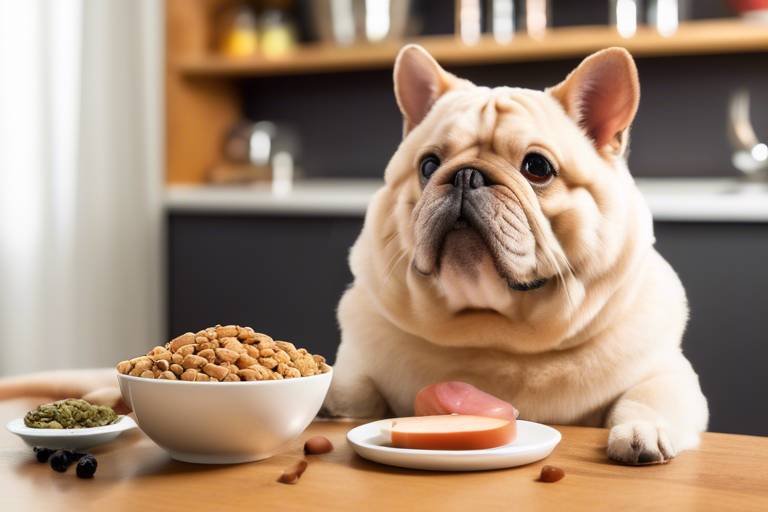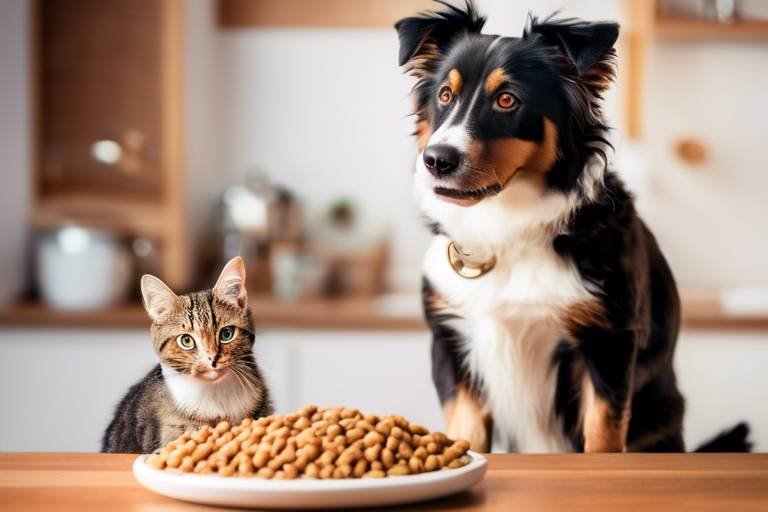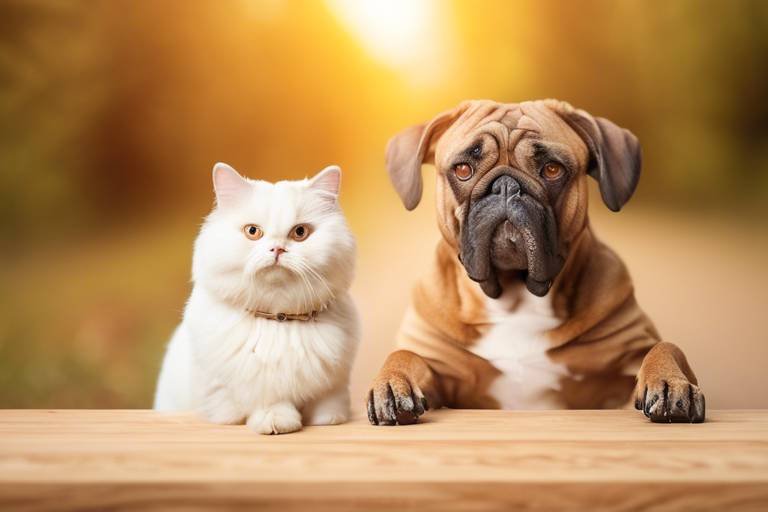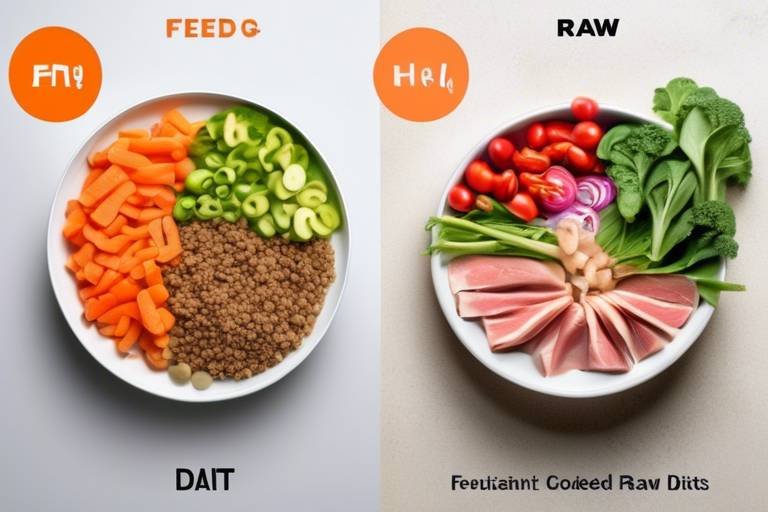The Role of Fats in Your Pet's Diet
Understanding the importance of fats in your pet's nutrition is essential for their overall health. Fats are often misunderstood and sometimes demonized in diets, but they play a vital role in keeping your furry friends healthy and happy. Think of fats as the fuel that powers your pet's body, similar to how gasoline fuels a car. Without it, everything just comes to a halt. In this article, we'll explore the different types of fats, their benefits, and how you can effectively incorporate them into your pet's diet.
Fats can be categorized into three main types: saturated, unsaturated, and trans fats. Each type plays a different role in your pet's diet, influencing energy levels, skin health, and overall well-being. Saturated fats are typically solid at room temperature and can be found in animal products like meat and dairy. Unsaturated fats, on the other hand, are usually liquid and are derived from plant oils and fish. Trans fats are often found in processed foods and should be avoided as they can lead to health issues.
Fats provide essential fatty acids that support various bodily functions. They contribute to healthy skin, a shiny coat, and optimal brain function, making them crucial for your pet's health. Just like how we need certain vitamins and minerals, pets also require fats for their growth and development. Without adequate fat intake, your pet may experience issues such as dry skin, dull fur, and even cognitive decline.
Omega-3 fatty acids are known for their anti-inflammatory properties. They can help alleviate joint pain and improve heart health, making them an essential addition to your pet's diet. Imagine Omega-3s as the soothing balm that calms inflammation and promotes healing. They're particularly beneficial for older pets or those with chronic conditions, providing them with the relief they need to enjoy life fully.
Excellent sources of Omega-3 fatty acids include fish oil, flaxseed, and certain algae. Incorporating these into your pet's diet can enhance their overall health and vitality. For example, a few drops of fish oil can transform a bland meal into a nutritious feast, and your pet will thank you for it!
Omega-3s promote skin hydration and reduce dryness, resulting in a healthier, shinier coat. This is particularly beneficial for pets with skin allergies or sensitivities. Imagine your pet strutting their stuff with a glossy coat that turns heads—this is the magic of Omega-3s at work!
Omega-6 fatty acids are crucial for maintaining skin integrity and overall health. They work alongside Omega-3s to provide a balanced fatty acid profile in your pet's diet. Think of Omega-6s as the supportive partner that helps Omega-3s shine. Together, they create a harmonious balance that keeps your pet feeling their best.
Incorporating healthy fats into your pet's diet can be done through various methods, including choosing the right pet food and adding supplements. Understanding the right balance is key. Just like we need a balanced diet to thrive, pets also require a mix of nutrients to stay healthy. So, how can you ensure your pet gets enough healthy fats?
Selecting pet food that contains quality fat sources ensures your pet receives the necessary nutrients. Look for foods with named animal fats or oils listed in the ingredients. The ingredient list is your roadmap; it should lead you to high-quality sources that will benefit your pet's health.
If your pet's diet lacks sufficient fats, consider adding supplements like fish oil or flaxseed oil. Consult your veterinarian for appropriate dosages tailored to your pet's needs. This is especially important if your pet has specific health concerns or dietary restrictions. Remember, a little goes a long way, and the right supplement can make all the difference!
- Can I use human oils for my pet? - While some human oils are safe, it's essential to consult your vet before introducing any new oils to ensure they are suitable for your pet.
- How much fat should be in my pet's diet? - The amount of fat can vary based on your pet's age, size, and health. A balanced diet typically includes 8-15% fat.
- Are there any fats I should avoid? - Yes, avoid trans fats and highly processed oils, as they can lead to health issues.

Types of Fats
Understanding the importance of fats in your pet's nutrition is essential for their overall health. This article explores the types of fats, their benefits, and how to incorporate them into your pet's diet.
When it comes to your pet's diet, not all fats are created equal. Fats can be categorized into three main types: saturated fats, unsaturated fats, and trans fats. Each type has its unique characteristics and plays a different role in your pet's diet. It's crucial to understand these differences to ensure your furry friend receives the right nutrients.
Saturated fats are typically solid at room temperature and are found in animal products like meat and dairy. While they can provide energy, excessive consumption may lead to health issues, including obesity and heart disease. Thus, moderation is key. On the other hand, unsaturated fats, which include monounsaturated and polyunsaturated fats, are usually liquid at room temperature and are considered healthier options. These fats are found in sources such as fish, nuts, and vegetable oils. They help maintain a healthy heart and contribute to overall well-being.
Lastly, we have trans fats, which are artificially created through a process called hydrogenation. These fats are commonly found in processed foods and should be avoided in your pet's diet at all costs, as they can lead to serious health problems.
To summarize, here's a quick overview of the types of fats:
| Type of Fat | State at Room Temperature | Sources | Health Impact |
|---|---|---|---|
| Saturated Fat | Solid | Meat, Dairy Products | Can lead to obesity and heart disease if consumed in excess. |
| Unsaturated Fat | Liquid | Fish, Nuts, Vegetable Oils | Promotes heart health and overall well-being. |
| Trans Fat | Solid or Liquid | Processed Foods | Should be avoided; linked to serious health issues. |
By understanding the different types of fats, you can make informed decisions about your pet's diet. It's essential to prioritize unsaturated fats while limiting saturated and completely avoiding trans fats. Remember, the right balance of fats can significantly impact your pet's energy levels, skin health, and overall vitality.
Fats provide essential fatty acids that support various bodily functions. They contribute to healthy skin, a shiny coat, and optimal brain function, making them crucial for your pet's health.
Omega-3 fatty acids are known for their anti-inflammatory properties. They can help alleviate joint pain and improve heart health, making them an essential addition to your pet's diet.
Fish oil, flaxseed, and certain algae are excellent sources of Omega-3 fatty acids. Incorporating these into your pet's diet can enhance their overall health and vitality.
Omega-3s promote skin hydration and reduce dryness, resulting in a healthier, shinier coat. This is particularly beneficial for pets with skin allergies or sensitivities.
Omega-6 fatty acids are crucial for maintaining skin integrity and overall health. They work alongside Omega-3s to provide a balanced fatty acid profile in your pet's diet.
Incorporating healthy fats into your pet's diet can be done through various methods, including choosing the right pet food and adding supplements. Understanding the right balance is key.
Selecting pet food that contains quality fat sources ensures your pet receives the necessary nutrients. Look for foods with named animal fats or oils listed in the ingredients.
If your pet's diet lacks sufficient fats, consider adding supplements like fish oil or flaxseed oil. Consult your veterinarian for appropriate dosages tailored to your pet's needs.
Q: Can my pet get enough fats from their regular food?
A: Most commercial pet foods are formulated to include the necessary fats, but it's always good to check the ingredients for quality sources.
Q: How do I know if my pet is getting too much fat?
A: Signs of excessive fat intake can include obesity and lethargy. Always monitor your pet's weight and energy levels.
Q: Are there any fats that I should avoid completely?
A: Yes, trans fats should be avoided entirely as they can lead to serious health issues.

Health Benefits of Fats
When it comes to your pet's diet, fats are not just an afterthought; they're a crucial component that can significantly affect your furry friend's health and happiness. Just like humans, pets require a balanced diet that includes fats to thrive. These essential nutrients serve multiple roles, from providing energy to supporting cell structure. Imagine fats as the fuel that keeps your pet's engine running smoothly, ensuring they have the energy to play, explore, and enjoy life to the fullest.
One of the most notable benefits of incorporating healthy fats into your pet's diet is their ability to deliver essential fatty acids. These acids, which include Omega-3 and Omega-6, are vital for various bodily functions. They help maintain a healthy balance of hormones, support immune function, and keep your pet's skin and coat in tip-top shape. Think of them as nature's little helpers, working behind the scenes to keep everything functioning optimally.
Moreover, healthy fats can contribute to improved skin and coat health. Have you ever noticed a pet with a dull, dry coat? This can often be a sign that their diet lacks the necessary fats. Omega-3 fatty acids, in particular, are known for their anti-inflammatory properties, which can help alleviate skin irritations and promote a shiny, luxurious coat. It's like giving your pet a spa treatment from the inside out!
Furthermore, fats play a significant role in brain health. Just as Omega-3s are beneficial for human brain function, they are equally important for pets. These fatty acids support cognitive function and can even help slow down the cognitive decline in older pets. So, if you want to keep your pet sharp and alert as they age, ensuring they receive adequate Omega-3s is a must. It's like giving your furry friend a mental workout!
To summarize the health benefits of fats in your pet's diet, consider the following:
- Energy Source: Fats provide a concentrated source of energy, essential for active pets.
- Skin and Coat Health: Healthy fats lead to a shiny coat and reduce skin issues.
- Cognitive Function: Omega-3s support brain health and can improve cognitive function.
- Hormonal Balance: Fats are crucial for hormone production and regulation.
Incorporating the right types of fats into your pet's diet is essential for their overall well-being. By understanding the benefits and ensuring a balanced intake, you can help your pet lead a healthier, happier life.
Q: Can I feed my pet human food that contains fats?
A: While some human foods are safe for pets, it's important to avoid those that contain unhealthy fats, like trans fats. Always consult your vet before introducing new foods.
Q: How do I know if my pet is getting enough fats in their diet?
A: Look for signs such as a dull coat, dry skin, or low energy levels. If you're unsure, consult your veterinarian for dietary advice.
Q: Are there specific fats I should avoid?
A: Yes, trans fats and excessive saturated fats should be avoided. Focus on healthy sources like fish oil and flaxseed oil.
Omega-3 Fatty Acids
When it comes to your pet's health, are like the superheroes of the nutritional world. These essential fats are not just a trendy buzzword; they play a critical role in maintaining your furry friend's overall well-being. Imagine these fatty acids as tiny warriors, fighting inflammation and promoting health from the inside out. They are particularly known for their anti-inflammatory properties, which can be a game changer for pets suffering from joint pain or skin issues.
One of the most compelling reasons to include Omega-3s in your pet's diet is their ability to support heart health. Just like in humans, these fatty acids help to keep your pet's heart functioning optimally, reducing the risk of heart disease. Moreover, they contribute to healthy brain function, which is especially important for older pets who may be experiencing cognitive decline. Think of Omega-3s as the fuel that keeps your pet's brain sharp and ready for action!
But how do Omega-3 fatty acids actually work their magic? They help to regulate the production of inflammatory substances in the body. By doing this, they can alleviate symptoms of conditions such as arthritis, allergies, and even some skin disorders. In fact, pets with skin allergies often see a noticeable improvement in their condition when Omega-3s are added to their diet. It's like giving their skin a refreshing drink of water!
Let's take a closer look at the various benefits of Omega-3 fatty acids for your pet:
- Joint Health: Reduces inflammation and alleviates joint pain.
- Heart Health: Supports cardiovascular function and reduces the risk of heart disease.
- Skin and Coat: Promotes hydration and reduces dryness, leading to a shinier coat.
- Cognitive Function: Enhances brain health, particularly in aging pets.
Now, you might be wondering, "How can I ensure my pet is getting enough Omega-3s?" Well, incorporating these fatty acids into your pet's diet can be as simple as adding a few key ingredients. Foods like fish oil, flaxseed, and even certain types of algae are excellent sources of Omega-3 fatty acids. Not only do they provide the essential nutrients your pet needs, but they also enhance the flavor of their meals, making mealtime even more enjoyable!
In conclusion, Omega-3 fatty acids are not just a dietary supplement; they are vital components of your pet's nutrition that can lead to a healthier, happier life. By ensuring that your pet receives these essential fats, you are investing in their long-term health and vitality. So why wait? Start incorporating Omega-3s into your pet's diet today and watch them thrive!
Sources of Omega-3
When it comes to enriching your pet's diet with Omega-3 fatty acids, the choices are as diverse as they are delicious! Think of Omega-3s as the superheroes of fats, swooping in to save the day for your pet's health. They are found in several natural sources, each offering unique benefits. The most popular and effective sources include:
- Fish Oil: This is perhaps the most well-known source of Omega-3s. Rich in EPA and DHA, fish oil can significantly boost your pet’s health. Whether it’s salmon, sardines, or mackerel, incorporating fish oil into your pet’s diet can lead to improved skin, coat, and joint health.
- Flaxseed: If your pet is vegetarian or you prefer a plant-based option, flaxseed is an excellent alternative. It contains ALA (alpha-linolenic acid), which the body can convert into Omega-3s. You can sprinkle ground flaxseed over your pet's food for an easy and nutritious boost.
- Chia Seeds: These tiny seeds are packed with Omega-3s and can be easily added to your pet's meals. They also provide a good source of fiber, which is beneficial for digestion.
- Algal Oil: For those who want a sustainable and vegan source of Omega-3s, algal oil derived from algae is a fantastic option. It contains DHA and is often found in pet supplements.
Incorporating these sources into your pet’s diet can be as simple as adding a few drops of fish oil to their meals or mixing in some ground flaxseed. However, it’s crucial to ensure that you’re using high-quality products to avoid any harmful additives or contaminants. Always consult with your veterinarian before making significant changes to your pet’s diet, especially when introducing new supplements. With the right sources of Omega-3, you can help your furry friend enjoy a life full of energy, vitality, and a shiny coat!
1. How much Omega-3 should I give my pet?
The amount of Omega-3 varies depending on your pet's size, age, and health condition. It's best to consult your veterinarian for tailored recommendations.
2. Can I use human fish oil supplements for my pet?
While some human supplements may be safe, it's crucial to choose products specifically formulated for pets to ensure appropriate dosages and avoid harmful ingredients.
3. Are there any side effects of Omega-3 fatty acids?
Generally, Omega-3s are safe, but excessive amounts can lead to gastrointestinal upset or blood thinning. Always follow dosage recommendations from your vet.
4. How long does it take to see the benefits of Omega-3s?
You may start to notice improvements in your pet’s skin and coat within a few weeks, but overall health benefits can take longer, depending on the individual pet.
Benefits for Skin and Coat
Understanding the importance of fats in your pet's nutrition is essential for their overall health. This article explores the types of fats, their benefits, and how to incorporate them into your pet's diet.
Fats can be categorized into saturated, unsaturated, and trans fats. Each type plays a different role in your pet's diet, influencing energy levels, skin health, and overall well-being.
Fats provide essential fatty acids that support various bodily functions. They contribute to healthy skin, a shiny coat, and optimal brain function, making them crucial for your pet's health.
Omega-3 fatty acids are known for their anti-inflammatory properties. They can help alleviate joint pain and improve heart health, making them an essential addition to your pet's diet.
Fish oil, flaxseed, and certain algae are excellent sources of Omega-3 fatty acids. Incorporating these into your pet's diet can enhance their overall health and vitality.
Omega-3 fatty acids play a pivotal role in maintaining your pet's skin and coat health. Just like a well-tended garden flourishes, your pet's skin and fur can thrive with the right nutrients. These essential fats help in keeping the skin hydrated and reducing dryness, which is particularly beneficial for pets that suffer from allergies or sensitivities. When your pet receives adequate Omega-3s, you may notice a remarkable transformation in their coat, becoming shinier and more vibrant.
Moreover, Omega-3s can also help to alleviate conditions like eczema and dermatitis. By incorporating these fatty acids into your pet's diet, you are essentially providing a shield against various skin issues. You might be surprised to learn that a simple addition of fish oil or flaxseed oil can lead to such significant improvements. Consider this: if you were to nourish your skin from the inside out, wouldn't you glow too?
To summarize the benefits of Omega-3 fatty acids for skin and coat health, take a look at the table below:
| Benefit | Description |
|---|---|
| Hydration | Helps maintain moisture levels in the skin, reducing dryness. |
| Shinier Coat | Promotes a healthy, shiny coat that reflects good nutrition. |
| Allergy Relief | Can alleviate symptoms of skin allergies and sensitivities. |
| Skin Conditions | May reduce the severity of eczema and dermatitis. |
Omega-6 fatty acids are crucial for maintaining skin integrity and overall health. They work alongside Omega-3s to provide a balanced fatty acid profile in your pet's diet.
Incorporating healthy fats into your pet's diet can be done through various methods, including choosing the right pet food and adding supplements. Understanding the right balance is key.
Selecting pet food that contains quality fat sources ensures your pet receives the necessary nutrients. Look for foods with named animal fats or oils listed in the ingredients.
If your pet's diet lacks sufficient fats, consider adding supplements like fish oil or flaxseed oil. Consult your veterinarian for appropriate dosages tailored to your pet's needs.
- What are the signs that my pet needs more fats in their diet? Look for a dull coat, dry skin, or increased shedding.
- Can I give my pet human fish oil supplements? It's best to consult your veterinarian before giving human supplements to pets.
- How much fat should be included in my pet's diet? The amount varies by pet; consult your veterinarian for personalized advice.
- Are there risks associated with too much fat in a pet's diet? Yes, overconsumption can lead to obesity and other health issues.
Omega-6 Fatty Acids
When it comes to pet nutrition, are like the unsung heroes of the dietary world. These essential fats play a pivotal role in maintaining your pet's overall health and well-being. Just as we need a balance of nutrients in our diets, our furry friends also require a harmonious blend of Omega-3 and Omega-6 fatty acids to thrive. But what exactly are Omega-6 fatty acids, and why are they so important?
Omega-6 fatty acids are polyunsaturated fats that help maintain the integrity of cell membranes and support various bodily functions. They are crucial for skin health, as they help to keep your pet's skin hydrated and their coat looking shiny and vibrant. Without enough Omega-6, pets can suffer from dry, flaky skin and a dull coat. Imagine trying to keep a garden thriving without enough water; similarly, your pet's skin and coat need these fats to flourish.
Moreover, Omega-6 fatty acids play a significant role in the inflammatory response of the body. They can help your pet recover from injuries and support the immune system, ensuring your furry friend stays healthy and active. However, it’s essential to strike the right balance between Omega-6 and Omega-3 fatty acids. Too much Omega-6 can lead to excessive inflammation, while too little can compromise your pet's health. Think of it as a seesaw; both sides need to be balanced for optimal function.
So, where can you find these vital Omega-6 fatty acids? They are commonly found in various food sources, including:
- Vegetable oils such as sunflower oil, corn oil, and soybean oil
- Nuts and seeds
- Meat and poultry
Incorporating these sources into your pet's diet can help maintain their health and vitality. However, it's crucial to select high-quality pet foods that contain these beneficial fats. Look for products that list named animal fats or oils in the ingredients, as this ensures that your pet is getting the best possible nutrition.
As you navigate your pet's dietary needs, remember that moderation is key. While Omega-6 fatty acids are essential, they should complement Omega-3s for a balanced diet. Consulting with your veterinarian can help you determine the right balance and ensure that your pet is getting all the nutrients they need to live a happy, healthy life.
1. What are Omega-6 fatty acids?
Omega-6 fatty acids are essential fats that play a crucial role in maintaining skin health, cell membrane integrity, and supporting the immune system in pets.
2. Why are Omega-6 fatty acids important for my pet?
They help keep your pet's skin hydrated, promote a shiny coat, and support recovery from injuries, making them vital for overall health.
3. How can I ensure my pet gets enough Omega-6 fatty acids?
You can ensure your pet gets enough Omega-6 by choosing high-quality pet food that lists named animal fats or oils and incorporating sources like vegetable oils, nuts, and seeds into their diet.
4. Can too much Omega-6 be harmful?
Yes, an excess of Omega-6 fatty acids can lead to inflammation and other health issues, so it’s important to maintain a balance with Omega-3 fatty acids.

How to Incorporate Fats
Incorporating healthy fats into your pet's diet is more straightforward than you might think. The key is knowing where to look and how to make the right choices. First off, when you’re shopping for pet food, it’s essential to read the labels carefully. Look for products that list quality fat sources, such as named animal fats or oils, at the top of the ingredients list. This indicates that the food is rich in the necessary nutrients your furry friend needs. Just like you wouldn’t want to eat a diet filled with junk food, your pet deserves better than low-quality ingredients.
Now, let’s talk about supplements. If you suspect that your pet’s diet lacks sufficient fats, don’t fret! There are plenty of options available. Fish oil and flaxseed oil are two popular choices that can easily be added to your pet’s meals. However, it’s crucial to consult your veterinarian before starting any supplements. They can provide tailored advice on the appropriate dosages based on your pet’s size, age, and health condition. Think of it as customizing a meal plan to ensure your pet gets the right balance of nutrients.
Another method to incorporate healthy fats is through homemade meals. If you're feeling adventurous in the kitchen, you can prepare meals that include sources of healthy fats. For instance, adding a bit of coconut oil or olive oil to your pet’s food can enhance the flavor while providing essential fatty acids. Just remember, moderation is key! Too much fat can lead to obesity and other health issues, so it's essential to strike the right balance.
To help you visualize the types of fats and their sources, here’s a handy table:
| Type of Fat | Sources | Benefits |
|---|---|---|
| Omega-3 | Fish oil, flaxseed, algae | Anti-inflammatory, promotes healthy skin and coat |
| Omega-6 | Poultry fat, corn oil | Maintains skin integrity, supports overall health |
Lastly, it’s essential to monitor your pet's response to dietary changes. Keep an eye on their coat condition, energy levels, and overall health. If you notice improvements, you’re likely on the right track. And if you have any concerns, don’t hesitate to reach out to your veterinarian. They can provide insights and adjustments to ensure your pet thrives on a fat-inclusive diet.
1. Can I give my pet human food that contains fats?
While some human foods can be beneficial, it’s essential to avoid those that are high in unhealthy fats or additives. Always check with your veterinarian before introducing any human food into your pet's diet.
2. How much fat should I include in my pet's diet?
The amount of fat varies based on your pet’s size, age, and activity level. Generally, a balanced diet should consist of around 10-15% fat. Your veterinarian can help determine the best ratio for your pet.
3. Are there any risks associated with adding fats to my pet's diet?
Yes, too much fat can lead to obesity and other health issues. It’s crucial to maintain moderation and ensure a balanced diet.
4. What are the signs of a fatty acid deficiency in pets?
Common signs include dry skin, a dull coat, and increased shedding. If you notice these symptoms, consider evaluating your pet's diet.
Choosing the Right Pet Food
When it comes to , it's crucial to remember that not all fats are created equal. Just like humans, pets require a balanced diet to thrive, and the type of fats included in their food plays a significant role in their overall health. So, how do you ensure that your furry friend is getting the right kind of fats? Well, it all starts with reading the labels and understanding what goes into their food.
First and foremost, look for pet foods that list named animal fats or oils in the ingredients. This means that the source of the fat is clear and identifiable, which is a good sign of quality. For instance, you might see ingredients like chicken fat or salmon oil. These fats are not only more nutritious but also more palatable for your pet. On the other hand, vague terms like “animal fat” or “meat by-products” should raise a red flag. You want to avoid foods that are unclear about their fat sources, as they may lack the essential nutrients your pet needs.
Moreover, consider the fatty acid profile of the food. A balanced ratio of Omega-3 and Omega-6 fatty acids is essential for maintaining your pet's health. Ideally, you want to see a good mix of these fatty acids, as they work together to support various bodily functions. To help you understand this better, here’s a simple table that outlines the roles of these fatty acids:
| Fatty Acid | Role in Pet Health |
|---|---|
| Omega-3 | Anti-inflammatory properties, supports heart health, promotes healthy skin and coat |
| Omega-6 | Maintains skin integrity, supports overall health, promotes healthy coat |
Additionally, it's worth considering your pet's specific needs. For example, if your pet has certain health conditions, you may want to consult your veterinarian about foods that are rich in Omega-3 fatty acids, as these can help with inflammation and joint pain. On the flip side, pets that are more active may require foods with higher fat content to provide the necessary energy levels.
Finally, don’t forget about the importance of quality over quantity. Sometimes, premium pet foods may come with a higher price tag, but they often contain better ingredients, which can lead to fewer health issues down the line. Investing in quality pet food is like investing in your pet's health; it pays off in the long run. So, take your time, do your research, and choose wisely!
- What types of fats should I look for in pet food? Look for named animal fats like chicken fat and oils like salmon oil, which are high in essential fatty acids.
- How can I tell if my pet's food has enough Omega-3s? Check the ingredient list for sources like fish oil, flaxseed, or algae. You can also consult your vet for recommendations.
- Is it necessary to supplement my pet's diet with fats? If your pet's food lacks sufficient fats, supplements like fish oil can be beneficial, but it's best to consult your veterinarian first.
Supplementing with Fats
When it comes to ensuring your furry friend gets the right amount of healthy fats, sometimes their regular diet just doesn't cut it. This is where can make a significant difference. Think of it like adding a turbocharger to a car—while it might run fine without it, the extra boost can enhance performance and efficiency. In the world of pet nutrition, fats serve as that turbocharger, providing essential nutrients that keep your pet thriving. But how do you go about supplementing their diet without overwhelming their system?
First and foremost, it’s crucial to consult your veterinarian before introducing any new supplements. They can help you determine the specific needs of your pet based on factors such as age, weight, and health conditions. For example, if your dog is older and has joint issues, they may benefit significantly from Omega-3 fatty acids, which are known for their anti-inflammatory properties.
Once you've got the green light from your vet, consider the various forms of fat supplements available. Here are some popular options:
- Fish Oil: Rich in Omega-3 fatty acids, fish oil is one of the most recommended supplements. It can be found in liquid form or as capsules. Just a few drops mixed into your pet’s food can help improve skin and coat health.
- Flaxseed Oil: This is another excellent source of Omega-3s, especially for pets that may have allergies to fish. Flaxseed oil can be easily added to meals, providing a plant-based alternative.
- Cod Liver Oil: Not only does this oil provide Omega-3s, but it’s also packed with vitamins A and D, making it a double whammy for your pet’s health.
It's important to monitor your pet's reaction to any new supplement. Look for signs of improvement, such as a shinier coat, increased energy levels, or better overall health. However, be cautious about over-supplementing. Too much fat can lead to weight gain and other health issues, so start with small amounts and gradually increase as needed.
Another effective way to incorporate healthy fats is through whole food sources. Adding foods like cooked salmon or sardines to your pet's meals can provide natural fats that are easy for them to digest. Just remember to remove any bones and skin, as these can pose choking hazards or digestive issues.
In summary, supplementing with fats can greatly enhance your pet's diet, but it’s essential to do it wisely. By consulting with your veterinarian and choosing quality sources, you can ensure that your furry companion receives the benefits they need without any adverse effects. It’s all about striking that perfect balance, much like a well-tuned orchestra where each instrument plays its part harmoniously.
Q: How do I know if my pet needs fat supplements?
A: If your pet shows signs of dry skin, a dull coat, or low energy, it may benefit from additional fats. Always consult your veterinarian for personalized advice.
Q: Can I give my pet human supplements?
A: While some human supplements may be safe, it’s best to use products specifically formulated for pets to avoid any harmful ingredients.
Q: How often should I supplement my pet's diet with fats?
A: This depends on your pet's specific needs and the type of fat supplement used. Follow your veterinarian's guidance for the best results.
Frequently Asked Questions
- What types of fats are essential for my pet's diet?
There are three main types of fats that are important for your pet's diet: saturated fats, unsaturated fats, and trans fats. Unsaturated fats, particularly Omega-3 and Omega-6 fatty acids, are crucial for maintaining your pet's overall health and well-being.
- Why are Omega-3 fatty acids important?
Omega-3 fatty acids are known for their anti-inflammatory properties. They can help alleviate joint pain, improve heart health, and contribute to a shiny coat. Incorporating Omega-3s into your pet's diet can significantly enhance their quality of life.
- How can I tell if my pet is getting enough fats?
Signs that your pet may not be getting enough healthy fats include dry skin, a dull coat, and low energy levels. If you notice these symptoms, it might be time to evaluate their diet and consider adding more healthy fats.
- What are some good sources of Omega-6 fatty acids?
Omega-6 fatty acids can be found in various sources, including chicken fat, sunflower oil, and corn oil. These fats help maintain skin integrity and overall health, working in harmony with Omega-3s.
- How can I incorporate healthy fats into my pet's diet?
You can incorporate healthy fats into your pet's diet by selecting high-quality pet food that lists named animal fats or oils in the ingredients. Additionally, consider adding supplements like fish oil or flaxseed oil, but consult your veterinarian for the right dosage.
- Are there any risks associated with feeding my pet too much fat?
Yes, while fats are essential, too much can lead to obesity and other health issues. It's important to maintain a balanced diet and consult your veterinarian to determine the appropriate fat intake for your pet.
- Can I use human food to provide healthy fats for my pet?
Some human foods, like certain fish and flaxseeds, can be beneficial for pets when given in moderation. However, always check with your veterinarian before introducing new foods to ensure they are safe and suitable for your pet.


















